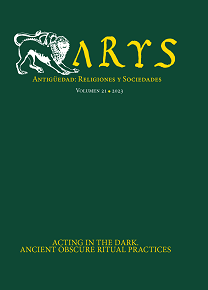Con los muertos entre tinieblas
El Nekyomanteion del Aqueronte
DOI:
https://doi.org/10.20318/arys.2023.7436Palabras clave:
Nekyomanteion, Hades, Éfira, Epiro, necromancia, oráculos de la muerte, oráculos griegosResumen
El objetivo de este estudio es una revisión del debate en torno a la identificación del yacimiento de Mesopotamon, en la costa del Epiro, como el famoso Nekyomanteion del Aqueronte. Mediante la comparación y examen de los argumentos de cada hipótesis se tratará de mostrar una visión razonada sobre aquellos aspectos que nos permitan decantarnos por una teoría u otra.
Descargas
Referencias
Baatz, Dietwulf (1979). Teile hellenistische Geschütze aus Griechenland. Archäologischer Anzeiger, 1, pp. 68-75.
Baatz, Dietwulf (1982). Hellenistische Katapulte aus Ephyra (Epirus). Mitteilungen des Deutschen Archäologischen (Athenische Abt.), 97, pp. 211-233.
Besonen, Mark R., Rapp, George & Jing, Zhichun (2003). The Lower Aqueron River Valley. Ancient Accounts and the Changing Landscape. En Wiseman & Zachos, 2003, pp. 199- 263.
Bonnechere, Pierre (2003). Trophonios de Lébadée. Cultes et mythes d’une cité béotienne au miroir de la mentalité antique. Leiden & Boston: Brill.
Chapinal-Heras, Diego (2021). Experiencing Dodona. The Development of the Epirote Sanctuary from Archaic to Hellenistic Times. Berlin & Boston: De Gruyter.
Chouliaras, Ioannis P. & Pliakou, Georgia (eds.) (2019). Θεσπροτία I. Α΄Διέθνες Αρχαιολογικό Και Ιστορικό Συνέδριο Για Τη Θεσπρωτία. Ηγουμενίτσα, 8-11 Δεκεμβρίου 2016. Ioannina: Ypourgeio Politismou.
Cusset, Christophe (ed.) (1999). La Nature et ses représentations dans l’Antiquité. Actes du Colloque des 24 et 25 Octobre 1996. Paris: École Normale Súperieure de Fontenay-Saint-Cloud.
Dakaris, Sotirios I. (1958 [1966]). Ἀνασκαφικαὶ ἔρευναι εἰς τὴν ὁμηρικὴν Ἐφύραν καὶ τὸ νἐ κυομαντετον τῆς ἀρχαίας Θεσπρωτίας. Praktika, pp. 107-113.
Dakaris, Sotirios I. (1960 [1966]). Ἀνασκαφὴ τοῦ νεκυομαντείου τὸῦ Ἀχέροντος καὶ θολωτὸῦ τάφου πλησίον τῆς Πάργας. Praktika, pp. 114-127.
Dakaris, Sotirios I. (1961 [1964]). Ανασκαφή εις το Νεκυομαντείον του Αχέροντος. Praktika, pp. 108-119.
Dakaris, Sotirios I. (1963 [1966]). Ανασκαφή εις το Νεκυομαντείον του Αχέροντος. Praktika, pp. 89-92.
Dakaris, Sotirios I. (1964 [1966]). Ανασκαφή εις το Νεκυομαντείον του Αχέροντος. Praktika, pp. 44-53.
Dakaris, Sotirios I. (1972). The Antiquity of Epirus. The Acheron Necromanteion; Ephyra-Pandosia-Cassope. Athens: Apollon.
Dakaris, Sotirios I. (1975 [1977]). Ανασκαφή εις το Νεκυομαντείον του Αχέροντος. Praktika, pp. 146-152.
Dakaris, Sotirios I. (1977 [1980]). Νεκυομαντείο - Εφύρα - Κασσώπη. Praktika, pp. 140-148.
Dakaris, Sotirios I. (1990 [1993]). Νεκυομαντείο του Αχέροντος. Praktika, pp. 165-167.
Dakaris, Sotirios I. (1991 [1994]). Νεκυομαντείο του Αχέροντος. Praktika, pp. 178-181.
Dakaris, Sotirios I. (1993). The Nekyomanteion of the Acheron. Athens: Archaeological Receipts Fund.
Dakaris, Sotirios I. & Papadopoulou, Athanasios (1976 [1978]). Ανασκαφή στο Νεκυομαντείο του Αχέροντος και στην ακρόπολη της Εφύρας. Praktika, pp. 146-152.
Dillon, Matthew (2017). Omens and Oracles. Divination in Ancient Greece. London & New York: Routledge.
Ekroth, Gunnel & Nilsson, Ingela (eds.) (2018). Round Trip to Hades in the Eastern Mediterranean Tradition. Visits to the Underworld from Antiquity to Byzantium. Leiden & Boston: Brill.
Fouache, Éric & Quantin, François (1999). Représentations et réalité géographique de l’entrée des enfers de Thesprôtie. En Cusset, 1999, pp. 29-61.
Franke, Peter R. (1961). Die antiken Münzen von Epirus. Wiesbaden: Steiner.
Friese, Wiebke (2018). Following the Dead to the Underworld. An Archaeological Approach to Graeco-Roman Death Oracles. En Ekroth & Nilsson, 2018, pp. 213-237.
Gardner, Chelsea A.M. (2021). The “Oracle of the Dead” at Ancient Tainaron. Reconsidering the Literary and Archaeological Evidence. Hesperia, 90, pp. 339-358.
Gehrke, Hans-Joachim & Wirbelauer, Eckhard (2004). Akarnania and Adjacent Areas. En Hansen & Nielsen, 2004, pp. 351-378.
Gravani, Konstantina & Katsikoudis, Nikolaos (2019). To Nεκρομαντείο στον Αχέροντα. Προτάσεις ερμηνείας. En Chouliaras & Pliakou, 2019, pp. 135-160.
Hammond, Nicholas G. L. (1967). Epirus. The Geography, the Ancient Remains, the History and the Topography of Epirus and Adjacent Areas. Oxford: Clarendon Press.
Hansen, Mogens H. & Nielsen, Thomas H. (eds.) (2004). An Inventory of Archaic and Classical Poleis. Oxford: University Press.
Ogden, Daniel (2001). Greek and Roman Necromancy. Princeton: Princeton University Press.
Oikonomidou-Karamesini, Manto (1990). Épire: relations politiques et économiques au IIIe et au IIe siècles jusqu’en 146 av. J.-C., d’après les monnaies. Revue Numismatique, 32, pp. 264-272.
Papadopoulos, Thanasios I. & Papadopoulou, Evangelia (2020). Ephyra-Epirus. The Mycenaean Acropolis. Results of the Excavations 1975-1986 and 2007-2008. Oxford: Archaeopress.
Pfanz, Hardy et al. (2014). The Ancient Gates to Hell and their Relevance to Geogenic CO2. En Wexler, 2014, pp. 92-117.
Pliakou, Georgia (2010). Sanctuaires des divinités féminines et culte d’Artémis en Epire centrale. Bulletin de Correspondance Hellénique, 134, pp. 414-419.
Richer, Jean (1994). Sacred Geography of the Ancient Greeks. Astrological Symbolism in Art, Architecture, and Landscape. New York: State University of New York Press.
Rusten, Jeffrey S. (1982). The Aeschylean Avernus. Notes on P.Köln 3.125. Zeitschrift für Papyrologie und Epigrafik, 45, pp. 33-38.
Tartaron, Thomas F. (2004). Bronze Age Landscape and Society in Southern Epirus, Greece. Oxford: BAR International Series.
Tzouvara-Souli, Chryseis (1979). Η Λατρεία των Γυναικείων Θεοτήτων εις την Αρχαίαν Ήπειρον. Συμβολή εις την Μελέτην της Θρησκείας των Αρχαίων Ηπειρωτών. Ioannina: Panepistimiou Ioanninon.
Vítek, Tomáš (2021). Greek Necromancy. Reality or Myth? Acta Antiqua Academiae Scientiarum Hungaricae, 60, pp. 27-51.
Wexler, Philip (ed.) (2014). History of Toxicology and Environmental Health, Toxicology in Antiquity I. Amsterdam: Elsevier.
Wiseman, James (1998). Rethinking the “Halls of Hades”. Oracle of the Dead or Fortified Farmstead? Archaeology, 51, pp. 12-18.
Wiseman, James & Zachos, Konstantinos (eds.) (2003). Landscape Archaeology in Southern Epirus, Greece, vol. 1. Hesperia Supplements, 32. Athens: American School of Classical Studies at Athens.
Descargas
Publicado
Número
Sección
Licencia
Los autores conservan los derechos de autor de sus textos y todos los derechos de publicación sin restricciones.
Los documentos incluyen desde 2021 la licencia Creative Commons 4.0: Atribución–No Comercial–Sin Obra Derivada (CC BY-NC-ND 4.0). Los documentos anteriores incluyen la licencia Creative Commons 3.0: Atribución-No Comercial-Sin Obra Derivada (CC BY-NC-ND 3.0)
